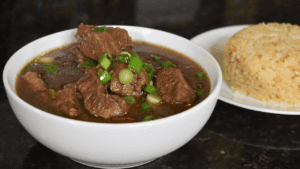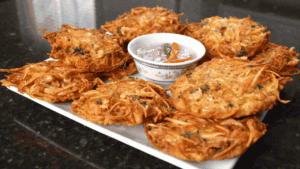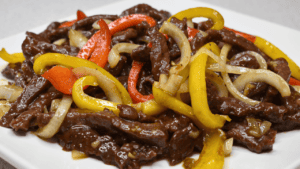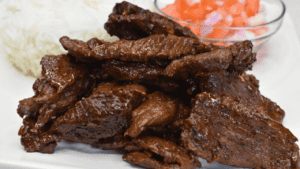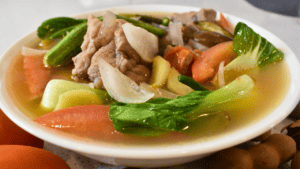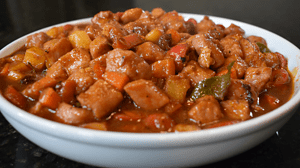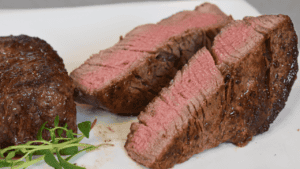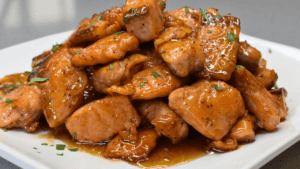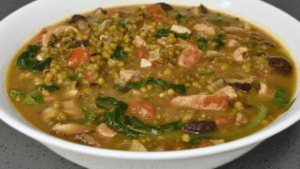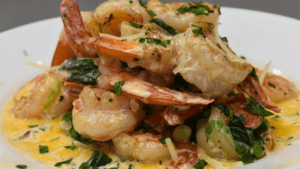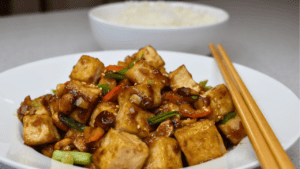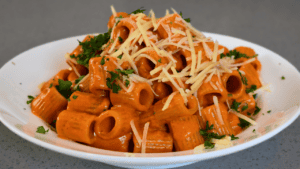Ginisang Monggo
Ginisang Monggo is a popular dish in Filipino cuisine that is made with mung beans, also known as “monggo” in Tagalog. This hearty and nutritious stew is a staple in many Filipino households, often being served as a side dish or even as the main course.
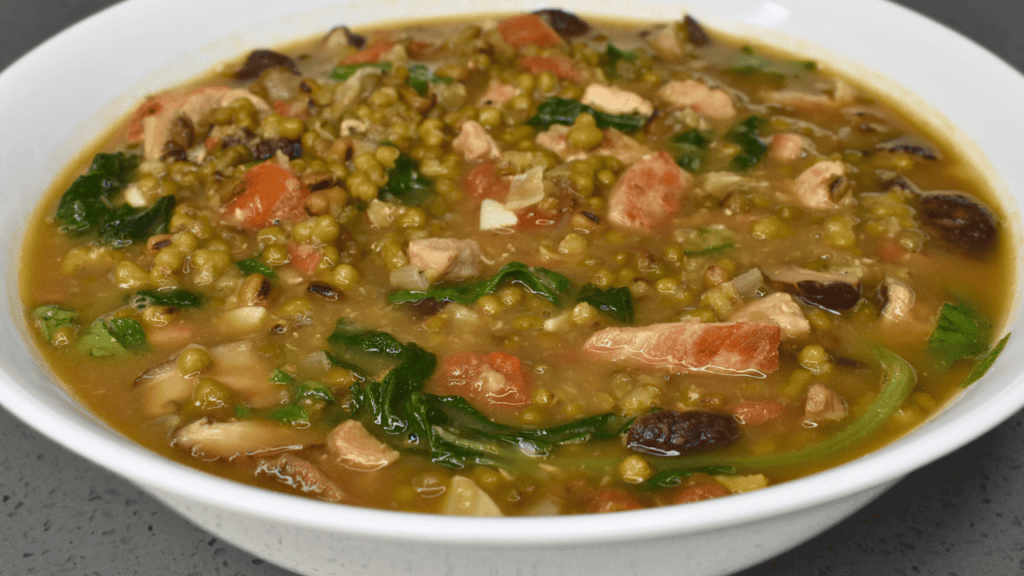
A Hearty Filipino Classic Ginisang Monggo Recipe for Every Home Cook
Discover the Comfort of Ginisang Monggo
Imagine a warm bowl of hearty stew, packed with flavors that take you straight to a tropical Filipino kitchen. Enter Ginisang Monggo, a beloved dish that holds a special place in Filipino cuisine. Known for its comforting taste and nourishing qualities, this dish is a staple in many households. But what makes Ginisang Monggo so special, and why should it become a part of your culinary repertoire?
In this blog post, you’ll uncover not only how to make Ginisang Monggo but also gain insights into its health benefits, learn about its variations, and discover the best ways to enjoy this classic Filipino dish. Whether you’re a home cook or a Filipino food lover, there’s something here for everyone.
The Health Benefits of Mung Beans
Before we jump into the recipe, let’s talk about the star ingredient: mung beans. Known as “monggo” in Tagalog, mung beans are small, green legumes that pack a powerful nutritional punch. They are rich in protein, making them an excellent choice for those looking to increase their protein intake without relying on meat.
Mung beans are also high in fiber, which aids in digestion and helps maintain a healthy gut. Additionally, they are low in fat and calories, making them a great option for those mindful of their calorie intake. With essential vitamins and minerals such as potassium, magnesium, and folate, mung beans contribute to heart health and can even help manage blood pressure.
Incorporating mung beans into your diet through dishes like Ginisang Monggo can provide these health benefits while offering a delicious and satisfying meal.
A Step-by-Step Guide to Cooking Ginisang Monggo
Now that you’re familiar with the health benefits of mung beans, it’s time to learn how to cook Ginisang Monggo. Follow this simple step-by-step guide to create a dish that’s sure to impress.
Ingredients
- 1 cup mung beans
- 5 cups water
- 1 lb pork, cut into long strips
- 1 small onion, diced
- 4 cloves garlic, chopped
- 1 medium tomato, chopped
- 1 tbsp olive oil
- 29 grams shiitake mushrooms
- 2 cups beef broth
- 1 piece beef bouillon cube
- ½ tsp salt
- ¼ tsp pepper
- 1 cup fresh ampalaya leaves (bitter gourd leaves)
Instructions
- Cook the Mung Beans: In a pot, combine the mung beans with water, cover, and boil over medium-high heat until they soften, approximately 45 minutes. Once cooked, remove from heat and set aside.
- Prepare the Pork Mixture: In a separate pan, fry the pork until it turns golden brown, then push it to the side of the pan. Add the onion and garlic, cooking for 2 minutes, followed by the tomato and mushroom. Season with salt and pepper to taste, and cook for an additional 10 minutes.
- Combine and Finish: Stir in the cooked mung beans, beef broth, and beef bouillon cube. Cook for another 10 minutes before adding the ampalaya leaves. Serve hot with steamed rice.
With these easy-to-follow steps, you’ll have a delicious pot of Ginisang Monggo ready in no time.
Variations and Customizations of Ginisang Monggo
One of the joys of cooking Ginisang Monggo is its versatility. Depending on your taste preferences or dietary needs, there are numerous ways to customize this dish.
Vegetarian Version
To make a vegetarian version, simply omit the pork and beef broth. You can substitute with vegetable broth for a flavorful alternative. Add more vegetables like spinach or kale for added nutrition and variety.
Seafood Twist
For a seafood twist, consider adding shrimp or fish to the dish. These ingredients pair well with mung beans and can add a delightful flavor profile. Simply sauté your chosen seafood with the onions and garlic before proceeding with the rest of the recipe.
Spicy Kick
If you prefer a bit of heat, incorporate sliced chili peppers or a dash of chili flakes during the cooking process. This will give your Ginisang Monggo an exciting spicy kick, perfect for those who love bold flavors.
Serving Suggestions for Ginisang Monggo
Ginisang Monggo is a versatile dish that can be enjoyed in various ways. Here are a few suggestions to enhance your dining experience:
Classic Pairing
Serve Ginisang Monggo with steamed jasmine rice for a classic Filipino meal. The rice complements the flavors and adds a comforting element to the dish.
Sides and Accompaniments
Consider pairing your Ginisang Monggo with other Filipino favorites such as fried fish, crispy spring rolls, or grilled meat for a complete and satisfying meal.
Refreshing Beverages
To balance the richness of the dish, serve it alongside a refreshing beverage like calamansi juice or a cool glass of iced tea. These drinks can cleanse the palate and add an extra layer of enjoyment.
Where to Find Ingredients for Ginisang Monggo
Finding the right ingredients is key to creating an authentic Ginisang Monggo. Here’s where you can source them, especially if you’re not familiar with Filipino ingredients:
Local Asian Markets
Start by visiting local Asian markets, which often carry a wide variety of Filipino ingredients, including mung beans and ampalaya leaves. The staff can guide you to specific items if you’re unsure.
Online Grocery Stores
For convenience, consider ordering your ingredients online. Many online grocery stores offer international sections where you can find the necessary components for Ginisang Monggo.
Substitutions
If you’re unable to find certain ingredients, feel free to substitute with similar ones. For instance, if ampalaya leaves are unavailable, spinach or kale make excellent alternatives.
Bringing It All Together
Cooking Ginisang Monggo is not just about preparing a meal; it’s about experiencing a piece of Filipino culture. This dish offers a harmonious blend of flavors and textures that can satisfy any palate. With its rich history and nutritional benefits, Ginisang Monggo is a must-try for home cooks and Filipino cuisine enthusiasts alike.
Now that you’ve learned how to make this delicious dish at home, we encourage you to give it a try! Share your creations and experiences with us—we’d love to see how you bring this classic recipe to life in your own kitchen.
Frequently Asked Questions About Ginisang Monggo
What is Ginisang Monggo made of?
Ginisang Monggo is primarily made with mung beans, pork, onions, garlic, tomatoes, and ampalaya leaves. It’s a hearty stew that combines these ingredients to create a flavorful and nutritious dish.
What to pair with Ginisang Monggo?
Ginisang Monggo pairs well with steamed rice and is often served alongside Filipino favorites like fried fish or grilled meat. The combination of flavors creates a satisfying meal.
Is Ginisang Monggo healthy?
Yes, Ginisang Monggo is considered healthy due to the nutritional benefits of mung beans. They’re rich in protein, fiber, and essential vitamins, making it a nutritious choice.
What is the English name of monggo?
The English name for monggo is mung beans. These small green legumes are a staple in many Asian dishes and are known for their health benefits.
What are mung beans called in America?
In America, mung beans are commonly referred to as mung beans or green grams. They’re available in most Asian grocery stores and health food markets.
Do mung beans increase uric acid?
Mung beans are generally low in purines and not known to significantly increase uric acid levels. However, individuals with gout should consume them in moderation and consult with a healthcare professional if needed.
Is it OK to eat monggo every day?
Yes, it’s generally safe to eat monggo every day as part of a balanced diet. Its nutritional profile supports overall health, but as with any food, moderation is key.
How long to soak mung beans before cooking?
It’s recommended to soak mung beans for at least 4 hours or overnight before cooking. This helps reduce cooking time and improves digestibility.
Why do we need to soak monggo seeds?
Soaking monggo seeds softens them, reducing cooking time and making them easier to digest. It also helps enhance their nutritional absorption.
More Delicious Recipes You’ll Love
If Ginisang Monggo has sparked your interest in Filipino cuisine, here are more delightful recipes to explore:
- Beef Tapa: A savory breakfast favorite marinated in a blend of soy sauce, garlic, and spices.
- Crispy Okoy: Enjoy delicious shrimp and vegetable fritters that are perfect as snacks or appetizers.
- Beef Pares: Savor the rich flavors of braised beef paired with a delightful soup.
- Classic Pork Sinigang: Experience the tangy goodness of this tamarind-based soup with tender pork and vegetables.
- Chop Suey: Delight in a colorful mix of stir-fried vegetables tossed with your choice of protein.
Dive into these recipes and continue your culinary exploration of Filipino flavors!
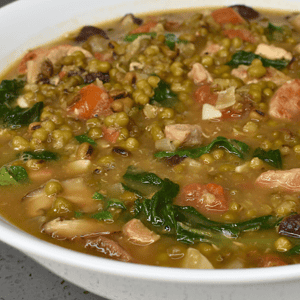
Ginisang Monggo
Ingredients
- 1 cup mung beans
- 5 cups water
- 1 lb pork cut into long strips
- 1 small onion diced
- 4 cloves garlic chopped
- 1 medium tomato chopped
- 1 tbsp olive oil
- 29 grams shiitake mushroom
- 2 cups beef broth
- 1 piece beef bouillon cube
- ½ tsp salt
- ¼ tsp pepper
- 1 cup fresh ampalaya leaves (bitter gourd leaves)
Instructions
- In a pot, combine the mung beans with water, cover, and boil over medium-high heat until they soften, approximately 45 minutes. Once cooked, remove from heat and set aside.
- In a separate pan, fry the pork until it turns golden brown, then push it to the side of the pan. Add the onion and garlic, cooking for 2 minutes, followed by the tomato and mushroom. Season with salt and pepper to taste, and cook for an additional 10 minutes.
- Stir in the cooked mung beans, beef broth, and beef bouillon cube. Cook for another 10 minutes before adding the ampalaya leaves (bitter gourd leaves).
- Serve hot with steamed rice and enjoy your meal.
